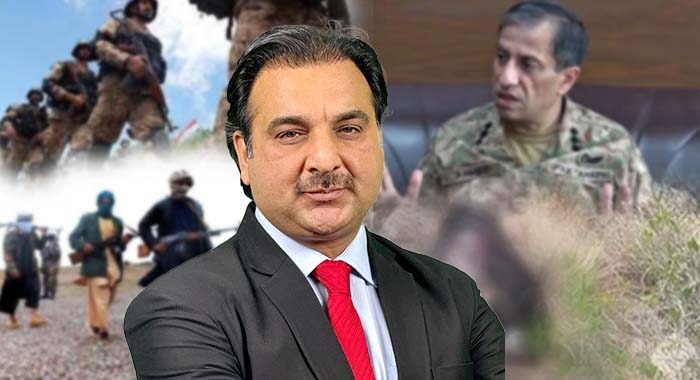Irfan Khan
The recent jirgas in Tirah Valley and the failed rounds of dialogue with the Taliban mark a decisive moment in Pakistan’s counterterrorism efforts. Despite repeated attempts at negotiation, the state’s patience has worn thin. Security officials have now delivered a clear, uncompromising message: “Work with us, hand over the militants, leave the area, or face action.” These are not mere words; they are the final line before operations. Yet, as the security threat deepens, Khyber Pakhtunkhwa’s political leadership remains consumed by optics, rhetoric, and constituency politics leaving the province vulnerable, leaderless, and adrift.
According to members of the jirga who participated in the latest talks, the dialogue in Tirah failed to produce results. Security agencies told tribal intermediaries in unambiguous terms that no armed group or Taliban faction would be tolerated. Those present were given options: cooperate with the state, hand over the militants, take action against them yourselves, or persuade them to leave Pakistan. Failing that, locals were advised to vacate temporarily to avoid collateral damage during operations.
The jirga returned frustrated and alarmed. The militants refused to comply. Their leaders, hiding across the border, demanded time a familiar tactic of delay. What began as negotiation has now become a countdown to confrontation. The situation mirrors the events in Bajaur, where failed talks eventually led to intelligence-based operations and heavy fighting until the militants were either neutralised or pushed into Afghanistan. The same path appears inevitable for Tirah and adjoining districts.
But behind the looming security operation lies a deeper failure one of governance, credibility, and political seriousness. Khyber Pakhtunkhwa’s police force, with 127,000 personnel and a staggering Rs121 billion budget, should be a formidable institution. Yet, it continues to suffer devastating losses. The assassination of senior officers like SP Gohari underscores that capacity on paper does not equal protection on the ground. In over a decade of conflict, successive PTI governments have failed to modernise the Counter-Terrorism Department (CTD) or equip the police with drones, surveillance systems, and the technology necessary for modern warfare.
When asked about the billions of rupees supposedly released by former chief minister Ali Amin Gandapur to the police, the Inspector General’s blunt response was revealing: “Not one rupee has reached us.” Such contradictions expose a governance model more focused on public announcements than operational outcomes.
Instead of institutional strengthening, politics has turned inward. Chief Minister Sohail Afridi, the province’s new chief executive, seems confined to his home district — holding peace jirgas in Bara, while the rest of the province faces rising militancy. His inability to meet his party leader, Imran Khan, adds another layer of political fragility. How can a leader govern a province under siege when he is politically isolated and administratively restrained?
The truth is that KP’s politics has become a substitute for governance. Protest, populism, and posturing have replaced planning. For eleven years, the province has suffered under governments that built narratives instead of institutions. Funds have been announced, rallies held, but the province’s core issues peace, education, healthcare, and corruption remain unresolved. Every administration, from Pervez Khattak to Mahmood Khan to Ali Amin Gandapur, and now Sohail Afridi, has repeated the same pattern: politics first, governance later and sometimes, never.
Meanwhile, the external threat endures. India continues to exploit instability in the region, supporting proxies and anti-Pakistan elements in Afghanistan. Economic subversion, information warfare, and political manipulation have all become tools in a long game designed to weaken Pakistan internally. Afghanistan’s interim government, despite assurances, remains reluctant to act decisively against the TTP. Pakistan’s stance is now unambiguous: dismantle the TTP presence or face the consequences of continued cross-border aggression.
At home, however, the fight is not just against militants it is against inertia. Without a functional provincial strategy, every security success risks being temporary. KP’s leadership must abandon its fixation on rallies and slogans and build a unified, provincial counterterrorism framework. That requires three things above all: institutional honesty, inter-party cooperation, and a return to public service over political showmanship.
First, the CTD must be restructured and modernised, with real funds and real oversight. Every rupee must be traceable from allocation to equipment purchase. Second, security policy must be depoliticised. A provincial peace council including opposition leaders, tribal elders, and civil society should meet regularly to coordinate responses to terrorism. Third, development must go hand in hand with defence. The people of Khyber, Bajaur, and Waziristan deserve roads, schools, hospitals, and economic opportunities not endless cycles of war and displacement.
Khyber Pakhtunkhwa stands at a crossroads. The jirga in Tirah was not merely a failed negotiation it was a mirror held up to the state’s own contradictions. If the government continues to substitute political theatre for security strategy, the next operation will not just target militants; it will expose the hollowness of provincial leadership.
Peace will not come from speeches in Bara or promises in Peshawar it will come when Khyber Pakhtunkhwa’s rulers stop performing politics and start practising governance.





